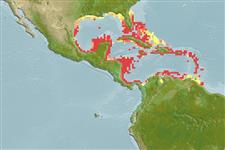Common names from other countries
Environment: milieu / climate zone / depth range / distribution range
Ecologia
marinhas associadas(os) a recifes. Tropical; 32°N - 6°N, 99°W - 56°W
Western Central Atlantic: Florida (USA), Bahamas and throughout the Caribbean. Absent from the Gulf of Mexico.
Tamanho / Peso / Idade
Maturity: Lm ? range ? - ? cm
Max length : 12.7 cm TL macho/indeterminado; (Ref. 13442)
Adults pale yellow; usually darker dorsally; grayish yellow that pales ventrally. Iridescent blue dorsal-ventral lines on head, sometimes extending to the leading edge of pelvic fins. One distinct blue line encircles the orbit and extends ventrally on each side of the fish. Two black pigment spots are sometimes found on the snout region of the nares. A large black saddle on caudal peduncle, extending below the lateral line on each side of the fish. Pelvic fins yellowish, pectorals clear.
Mainly carnivorous (Ref. 13810). Has been reared in captivity (Ref. 35420).
Life cycle and mating behavior
Maturidade | Reprodução | Desova | Ovos | Fecundidade | Larvas
Domeier, M.L., 1994. Speciation in the serranid fish Hypoplectrus. Bull. Mar. Sci. 54(1):103-141. (Ref. 26407)
Categoria na Lista Vermelha da IUCN (Ref. 130435)
CITES (Ref. 128078)
Not Evaluated
Ameaça para o homem
Harmless
Utilização humana
Aquário: Espécies comerciais
Mais informação
Nomes comunsSinónimosMetabolismoPredadoresEcotoxicologiaReproduçãoMaturidadeDesovaFecundidadeOvosDesenvolvimento dos ovos
ReferênciasAquaculturaPerfil para aquaculturaEstirpesGenéticaElectrophoresesHereditariedadeDoençasProcessamentoMass conversion
Ferramentas
Relatórios especiais
Descarregue XML
Fontes da internet
Estimates based on models
Preferred temperature (Ref.
115969): 25.6 - 28.2, mean 27.4 (based on 530 cells).
Phylogenetic diversity index (Ref.
82804): PD
50 = 0.5000 [Uniqueness, from 0.5 = low to 2.0 = high].
Bayesian length-weight: a=0.01778 (0.00680 - 0.04650), b=3.03 (2.80 - 3.26), in cm Total Length, based on LWR estimates for this (Sub)family-body shape (Ref.
93245).
Nível Trófico (Ref.
69278): 4.0 ±0.65 se; based on food items.
Resiliência (Ref.
120179): Elevada, tempo mínimo de duplicação da população menor que 15 meses (Preliminary K or Fecundity.).
Fishing Vulnerability (Ref.
59153): Low vulnerability (10 of 100).
